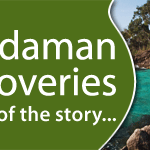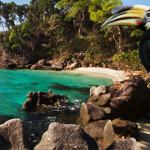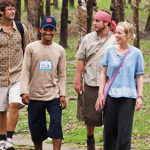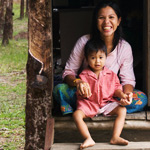Andaman Discoveries Blog
Thursday, December 29, 2011
Learning from the Moken
“Where are you from?, we asked the guides from the village. “From the Moken” they said.
Patiently we asked again: “Alright you are Moken, but… where are you from?” Their answer remained the same: “From the Moken”.
After a bumpy hour and a half ride on a speedboat and another short ride on a long-tail we have had finally arrived at the Moken Village on Surin Island off the North Andaman coast of Thailand.
AD founder Bodhi Garret was leading the pilot tour organized for our guests (writer Oliver and photographer Catherine) from the BBC’s Lonely Planet Magazine.
Bodhi has known the Moken people for some
 time now and the respect he has for them is mutual and evident from the way they greeted each other with friendly smiles and warm hugs. After all not many ‘farang’ speak Thai with ease like Bodhi does and are able to communicate directly with the indigenous peoples from this region. We all felt very privileged to be part of the pilot tour, which was meant to establish AD’s ‘Life of the Moken’ program as a responsible and ethical alternative to the tours, which others operate on the island.
time now and the respect he has for them is mutual and evident from the way they greeted each other with friendly smiles and warm hugs. After all not many ‘farang’ speak Thai with ease like Bodhi does and are able to communicate directly with the indigenous peoples from this region. We all felt very privileged to be part of the pilot tour, which was meant to establish AD’s ‘Life of the Moken’ program as a responsible and ethical alternative to the tours, which others operate on the island.The Moken have provoked interest ever since the tsunami struck this region and
 these nomadic sea gipsy people had to make a more permanent settlement on the island.
these nomadic sea gipsy people had to make a more permanent settlement on the island.It is no wonder that for us the question ‘where you from?’ seemed like a logical one, but the answer we received showed just how our perception of ones origin was only limited to indicate a place. For the Moken guides who were showing us around their village and gave us a glimpse of their world, this same question carries the meaning of the people you grew up with, the values that you learned, rather than a physical location.
Traditionally, the Moken sea nomads traveled to coastal and island areas in the Mergui Archipelago by their “kabang” (boat), which served both as a home and means of transportation. They would spend seven months fishing during the dry season and take refuge on land during the monsoon. As an ethnic minority in Thailand they are struggling to keep their legacy alive.
The Moken guides led us through their village, shared stories of their lives and gave insights into their struggles and dreams. On the “Chok Madah” Nature-Culture Trail through the jungle behind the village, they showed us various types of plants and trees that they use in daily life; edible herbs, healing plants and woods used for the construction of their huts and boats. In Moken language, Chok means a small bay, and Madah is the name of a local man who anchored his boat in the bay to gather shellfish and forest products. The Moken who now live a semi-nomadic life have used this foraging trail for generations. Twenty stations with interpretive signs are placed along the trail, providing information on specific topics and insights into the world of the Moken.

On a our second day accompanied by our Moken guides we set off on a long tail boat for a snorkeling dive, at a site known as Nemo bay, frequented by the beautiful clown fish of that name. To observe our Moken guides while snorkeling is an experience in itself, for you would never see someone show such grace and peacefulness while diving down to point at the hiding moray eel. Back on the boat Pi Tao, an elder Moken with a peaceful smile, had just finished brewing delicious coffee for all to enjoy.
A couple of days in the company of these kind hearted and warm people inevitably makes you appreciate their culture and wonder about their future. With no written language, their children are taught to speak, read, and write in Thai. This raises a challenge for passing on the traditional Moken language and knowledge to future generations.

The AD tour is specifically designed to take into consideration the Moken’s wishes, encouraging respectful and meaningful encounters between tourists and Moken people.
We spent the night in bungalows on one of the smaller northern islands. The landscape was hauntingly beautiful, the setting sun providing a spectacular background to the mangroves on the beach.
Upcoming tours will allow guests to take home not only picture souvenirs but also lasting memories. We hope to foster a new understanding between the Sea dwellers and us as we have a lot to learn from them.

You can participate in various activities in which your Moken guide will show you how to spear hunt, row a traditional Moken boat, weave small items out of pandanus leaf, and learn about their magical underwater world. You will also learn about their mythology and beliefs; as animists the Moken worship and believe in the spirits of nature.
Our adventure came to end but we know that we will return one day and hope to share this beautiful encounter with other likeminded people who want to experience the Moken culture and make a much needed contribution that will directly benefit the people you visit.
Labels: community-based tourism, education, Moken, responsible tourism
Wednesday, March 17, 2010
Indigenous Education - Koh Surin
The Moken are an ancient sea people who have travelled among the islands of Thailand’s North Andaman coast for thousands of years. Traditionally nomadic, they would spend most of their time out at sea in their boat houses and moored in sheltered locations during the monsoon season. In recent years, the Moken have responded to growing socio-economic pressures by settling permanently in Ao Bon Bay.
They have come to rely on selling handicrafts as an important source of income, but often have trouble communicating with visitors who wish to buy their woven baskets and hand-carved model boats. To help with this, Andaman Discoveries partnered with a local health worker to provide English lessons to the children of Koh Surin – we provided books, pencils, lesson plans, and a whiteboard. Andaman Discoveries is also sponsoring a “clean household” competition to encourage Moken to address the litter generated by good from the mainland.
Labels: education, Moken, North Andaman Region
Monday, January 18, 2010
Bright Futures
Scholarships Keep Dreams Alive
 Wilasinee “Clang” Klatalae dreams of completing her university degree in tourism management. “It’s my goal to communicate with foreigners from different cultures. I love nature, meeting people, and to travel and share experiences,” she said during her recent long-term scholarship interview.
Wilasinee “Clang” Klatalae dreams of completing her university degree in tourism management. “It’s my goal to communicate with foreigners from different cultures. I love nature, meeting people, and to travel and share experiences,” she said during her recent long-term scholarship interview.Clang is from Bak Jok village, which was totally destroyed in the tsunami five years ago; her father now earns about 8,000 Baht ($240) per month making model boats. Clang could not attend school without her scholarship “because we have to pay a lot of money for tuition, fees, boarding, and daily expenses. Without the scholarship, my father would have to work twice as much, and I would have to find a day job to support myself and my family.”
Andaman Discoveries needs your help to ensure Clang and the 130 students like her can continue receiving scholarships. Please consider helping us fund this valuable program. Donors can sponsor a student for about 15,000 Thai Baht (about $450) per year to cover educational expenses, and will receive updates regarding their sponsored youth’s academic performance as well as a personal letter.
The scholarship program provides financial support for students in primary school through university for a total of seven years, ensuring these students will have access to an education and the funds to cover textbooks and materials. “My life is getting better -- I’m very delighted to receive this scholarship because this make my dream come true,” said Clang.
Labels: community, education, scholarships, tsunami relief
Thursday, July 16, 2009
Lesson Plans
 Burmese Learning Center Welcomes Teachers
Burmese Learning Center Welcomes Teachers According to Thai law, all children, regardless of their status in the country, are entitled to receive an education. Children of migrant Burmese workers, however, face overwhelming challenges, including communication issues, the lack of resources for them at schools, and prohibitive expenses for supplies and uniforms. For these children, The Kuraburi Burmese Learning Center and volunteers like Rebecca Lilly (UK) are critical to a hopeful future.
“In the brief month that I taught at the Burmese Learning Center, I felt that I developed relationships with the students and teachers. The students’ confidence and skills grew steadily, as did mine, as I learned to find my footing as a teacher in Thailand,” said Rebecca, who volunteered from mid-May to mid-June. Rebecca chronicled her experiences as a first-time teacher, as well as adjusting to life in rural Thailand with a surprise reptilian roommate.
Teaching at the Burmese Learning Center is one of several long-term volunteering programs offered by Andaman Discoveries. We can also arrange placements at the Phuket Disabled School or a Southern Thailand Orphanage. For more on Rebecca’s experience, check out her recent blog posts.
Labels: Burmese Learning Center, education, migrant workers
Thursday, July 9, 2009
Rebecca’s Journal – Life at the Burmese Learning Center
 |
| Volunteer English teachers, Jeannine and Rebecca, prepare for an afternoon of classes at the Burmese Learning Center. |
The last week of school came too quickly. In the brief month that I taught at the Burmese Learning Center, I felt that I developed relationships with the students and teachers. The students’ confidence and skills grew steadily, as did mine, as I learned to find my footing as a teacher in Thailand.
It was motivating to learn that I could lead classes, despite being without a formal teaching background. The month at the Burmese Learning Center allowed me to discover an artist and teacher within me.
I was instantly made welcome by the Burmese Learning Center staff. The staff supported me, so that there was always someone there if I was to encounter any problems. The children are lovely, full of personality and a pleasure to teach. There is a great atmosphere at the center.
To anyone considering taking the leap to teach in Thailand through Andaman Discoveries - I have one word – Jump!
Labels: Burmese Learning Center, education, teaching english, volunteer
Monday, July 6, 2009
Rebecca’s Journal – First Day of School
I was filled with apprehension, clutching my lesson plans, as I awaited the start of my first day teaching.
The first class of the day was grade one. The class exuded enthusiasm, cheering, “Teacher, teacher, teacher!”
 |
| Rebecca takes in the scene near the Burmese Learning Center. |
Just as I began to feel panic, Sawsaw (one of the Burmese teachers) calmed the class down. The lesson ran surprisingly smooth. Drawing and singing proved to be keys to the students’ attention. I’m far from being in the category of the likes of Claude Monet or Vincent Van Gogh, but I decided I’d better develop my artistic side quickly to excel at this new role.
The rest of the first day was nerve racking, but an overall success. I introduced myself to the children. After their initial shyness dissipated (excluding grade one, who were certainly not shy), I felt the students responded well. I anticipated the next few weeks, excited to see just how far the students and I would grow. Monet just may have competition yet!
Labels: education, teaching english, volunteer
Wednesday, June 24, 2009
Rebecca's Journal - Introduction
Burmese Learning Center Welcomes English Teachers
We were fortunate to have Rebecca (UK) with us from mid-May to mid-June. She came to us through our partner organization, Twin UK, to teach English at the Burmese Learning Center.
 |
| Jeannine (volunteer English teacher), Kelly, Karen, and Rebecca at the Burmese Learning Center. |
Rebecca wrote about her experiences as a first-time teacher, being a newbie in Kuraburi and meeting her roommate, "Gary the Gecko."
“In the brief month that I taught at the Burmese Learning Center, I felt that I developed relationships with the students and teachers. The students' confidence and skills grew steadily, as did mine, as I learned to find my footing as a teacher in Thailand,” said Rebecca.
Her stories will be shared on the blog in the upcoming weeks, so check back soon.
Teaching at the Burmese Learning Center is one of several long-term volunteering programs offered by Andaman Discoveries. We can also arrange placements at the Phuket Disabled School or a Southern Thailand Orphanage.
Labels: Burmese Learning Center, education, Kuraburi, teaching english, volunteer
Friday, June 5, 2009
Peace Corps, Andaman Discoveries team up to help Thai youth
| Chris Allen, Peace Corps volunteer, with students participating in English language exercises. |
Removed from the tourist path, the Kuraburi area provides insight into Thai life. The downside: It is a challenge to find farang. They are a rare sight, especially in low season.
A United States Peace Corps volunteer traveled to Kuraburi in search of native-English speakers. Chris Allen, from Indiana, needed farangs (foreigners in Thai) to be themselves to assist in a mock exercise in Ban Triam village.
For more than a year, Chris has been at Ban Triam village, focusing on teacher collaboration and community outreach in his role with the Peace Corps. Ban Triam is about 20 kilometers from Kuraburi.
Chris’s search for native-English speakers led him to Andaman Discoveries. Karen Spackman, from Scotland, and LesIie Welshimer, from the U.S., agreed to travel to Ban Triam School and be themselves – farangs.
“If there is one thing I can do well in Thailand, it’s to speak fluent English and broken Thai,” Leslie said. “I had previously thought being a farang, who speaks broken Thai, was a weakness. Then in May I was sought out for doing what I do best – be myself, a confused farang for a day.”
Ajan Phahon, a remarkable teacher at Ban Triam, is completing his thesis on task-based learning. He has been a teacher at Ban Triam for 12 years. Four years ago he went to Bangkok to earn his master’s degree in teaching English as a second language.
Chris said, “Phahon is much more than an English teacher at the Ban Triam School. He teaches math, computers and dedicates his time as a volleyball coach. He’s a great teacher to work with, and it’s motivating to see the progress from the students practicing his task-based concepts.”
| Ajan Phahon with Andaman Discoveries’ team members, Karen and Leslie. |
To help teach the students learn English, Phahon arranged several real-life (task-based) situations for them to practice. One of Phahon’s goals was to help the students improve their confidence in speaking with farang.
The first task-based lesson was at a beach-view restaurant at Ao Khoei Beach. Chris, Karen and Leslie sat at the restaurant, enjoyed the view and played the part of customers. The students assumed the role of hostesses and waiters. They took food orders and ensured guest comfort, while they practiced speaking and listening in English.
The second lesson was held at bungalows near the restaurant. Karen and Leslie pretended to be customers looking for accommodations. The exercise involved asking questions like: How much does a room cost, does the room have air conditioning or fan, does the shower have hot or cold water and can I see the room?
The students gave a tour of the bungalows. Karen and Leslie asked more questions while looking at the bungalows. Karen said, “While I was helping the students practice English, I also found myself being sold on a night at this place. The sound of the ocean, comfortable rooms and the friendly service nearly caused me to open my wallet, forgetting it was all a mock exercise.”
| Students successfully completed the third English exercise of the day with Chris, Karen and Leslie. |
The final task-based situation was to go shopping at a small convenience store. The students practiced the role of customer service providers, while Chris, Karen and Leslie asked a variety of questions, like: What beverage do you recommend, how far away is the bus station and where I can find soap?
"Despite having few opportunities to communicate with English speakers, the students clearly had a significant grasp on the language. They were kind, attentive and displayed how much youth can excel with the dedication of good teachers like Chris and Phahon,” Karen said.
Chris continues to contribute his skills in Ban Triam and surrounding communities. He is actively planning an English language camp this month to help youth increase their confidence in conversing.
Labels: Ao Khoei Beach, education, teaching english, United States Peace Corps, volunteer
Tuesday, May 19, 2009
Scholarship Interviews -- Keeping Kids in School
Sponsor a Child Today
 Students have a lot on their minds: mathematics, history, language, and science, to name a few. Wondering how to pay for a school uniform or transportation to school should not be among those concerns. That’s why Andaman Discoveries started a scholarship program as part of its initial tsunami relief work. “The scholarship helps me achieve my dreams,” said scholarship recipient Chanthip Sunsab of Tung Dap (pictured). Andaman Discoveries scholarships provide financial support for 129 underprivileged in the region children like Chanthip, allowing them to complete high school. The money from the scholarships helps offset expenses like school uniforms, transportation to school, extra books (Thai government supplies basic curriculum books), and extra tuition for classes like computer studies.
Students have a lot on their minds: mathematics, history, language, and science, to name a few. Wondering how to pay for a school uniform or transportation to school should not be among those concerns. That’s why Andaman Discoveries started a scholarship program as part of its initial tsunami relief work. “The scholarship helps me achieve my dreams,” said scholarship recipient Chanthip Sunsab of Tung Dap (pictured). Andaman Discoveries scholarships provide financial support for 129 underprivileged in the region children like Chanthip, allowing them to complete high school. The money from the scholarships helps offset expenses like school uniforms, transportation to school, extra books (Thai government supplies basic curriculum books), and extra tuition for classes like computer studies.Because of the positive impact of this program, we hope to offer to up to ten more scholarships focused on conservation and sustainability this year. But we need your help in sponsoring more youth. “There is further need for new donors to support youth in our communities. Each year children start school with need for uniforms, transport and supplies to ensure their education is a success,” said Thamrong Chomphusri, Andaman Discoveries Director. If you’re interested in sponsoring the education of a student in the North Andaman region, please contact Andaman Discoveries to learn how you can become a donor, and read the full article for more details about scholarships and the recent round of interviews.
 Students who receive scholarships come from a wide range of communities within the North Andaman region, including the twelve tsunami-affected villages Andaman Discoveries originally worked with. “The sponsorship helps me go to a further away school where the teachers have more time for the students. This helps my grades,” said Noparyj Sae-leab, a scholarship recipient.
Students who receive scholarships come from a wide range of communities within the North Andaman region, including the twelve tsunami-affected villages Andaman Discoveries originally worked with. “The sponsorship helps me go to a further away school where the teachers have more time for the students. This helps my grades,” said Noparyj Sae-leab, a scholarship recipient.A requirement of the scholarship program is that students must come for follow-up interviews and progress reports. Interviews are held annually with scholarship recipients to monitor their progress and discuss their goals for the upcoming year. We interviewed Each student was interviewed and asked to make a card with a message to their donor. The interviews included questions about their favorite, their goals for the next five years, and how they plan to achieve those goals.
The price of making a tremendous difference in a youth’s life is about 6,000 baht (about $170) per student for a one-year scholarship (grade K -9). A one-year scholarship for one student in grades 10-12 is 15,000 baht (about $425). Donors of scholarships receive regular updates, including grade reports and details from the interview. The scholarships support the students throughout their education.
Labels: education, scholarship
Subscribe to Posts [Atom]







